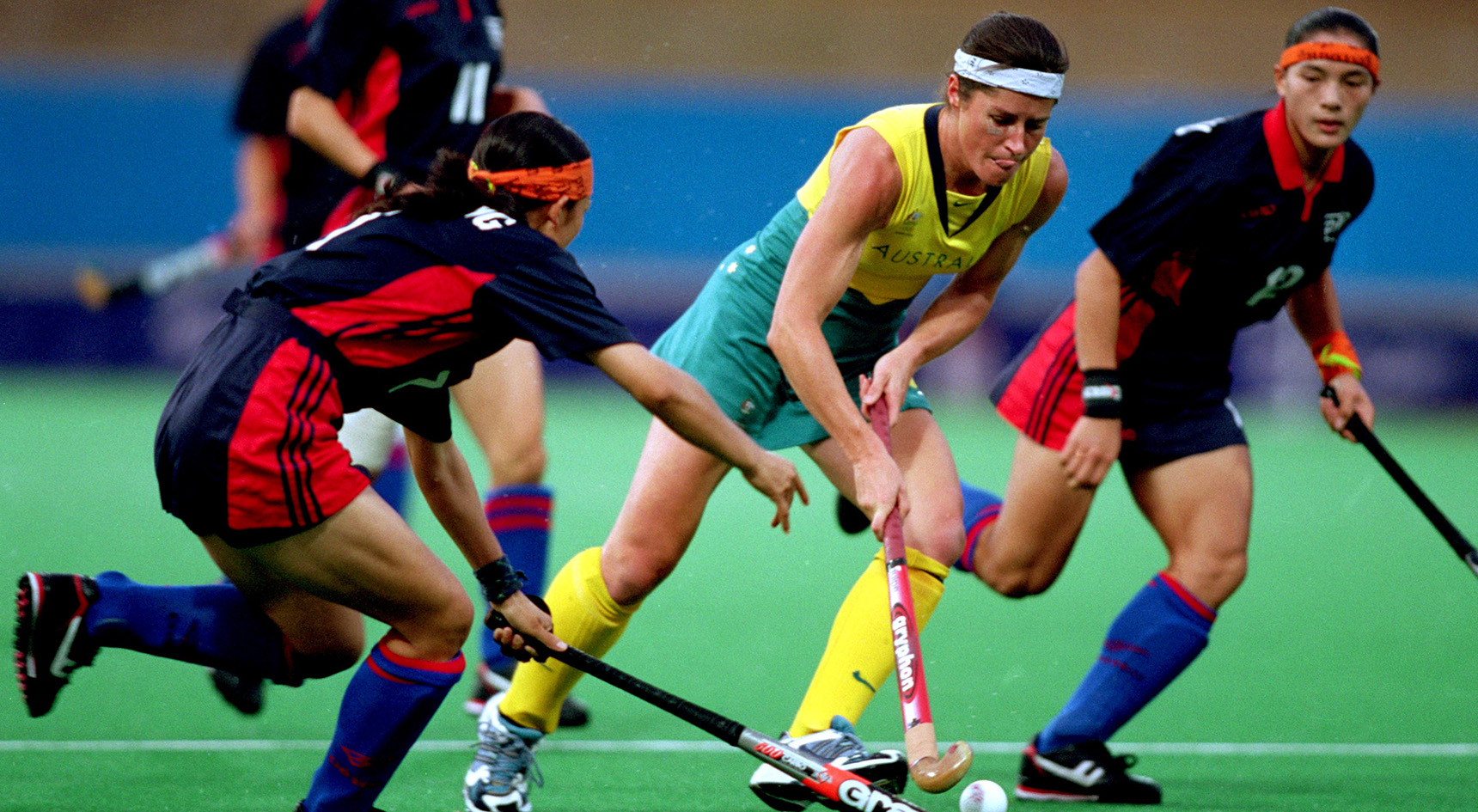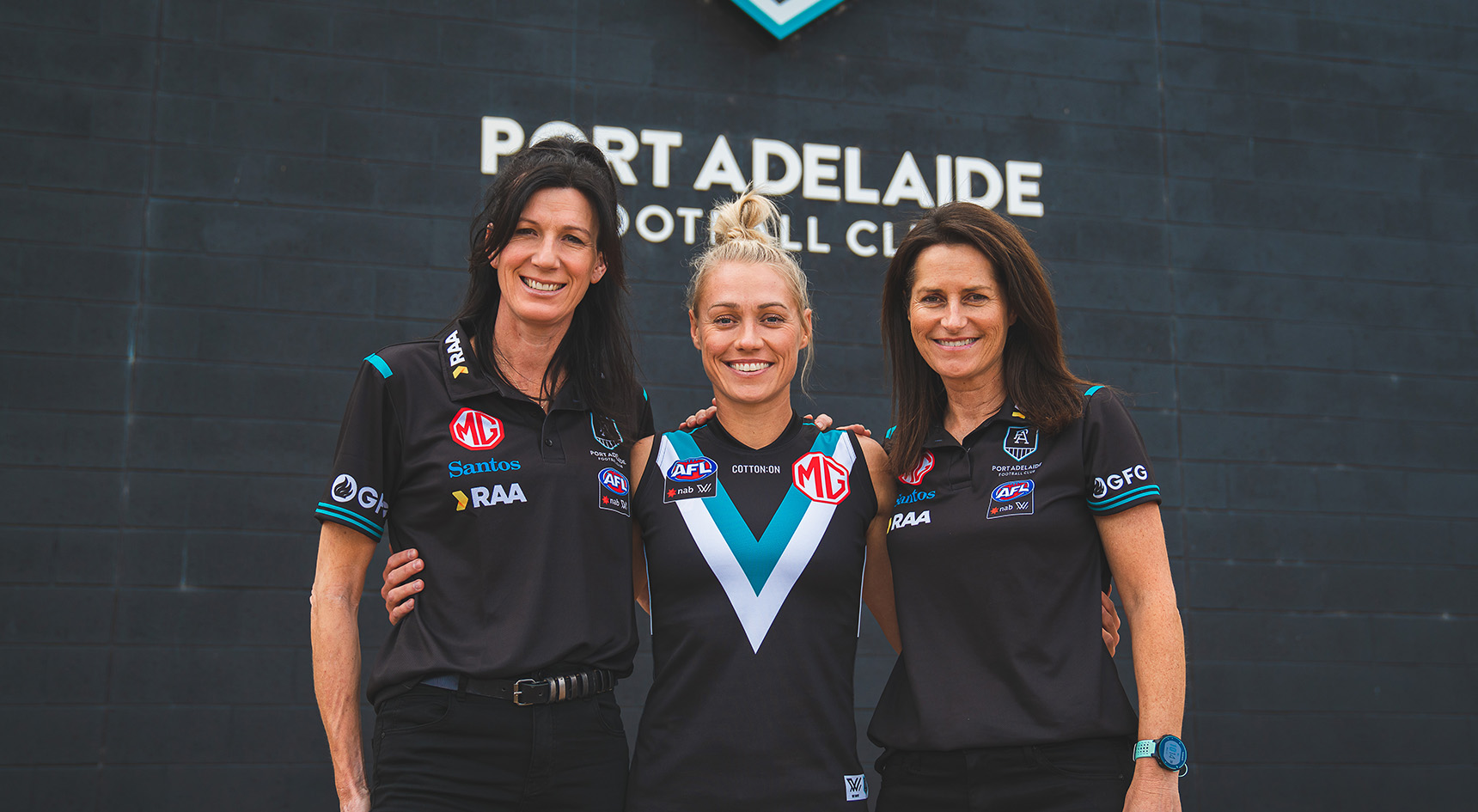5 tips on becoming an elite athlete

Two-time Olympic gold medallist, Juliet Haslam, shares her journey to becoming an elite athlete and returning home to Alberton Oval as Port Adelaide Football Club’s Head of AFLW.
Walking into Alberton Oval, there’s an atmospheric feeling of change. It’s more than the looming grey clouds and desperate blue sky battling each other for prime position. And it’s not just the cyclone fences masking the tools that are still working on major precinct developments at Port Adelaide Football Club’s (PAFC) hallowed ground.
Deep in the Fos Williams stand, among the newly constructed walls of PAFC’s women’s football hub, I meet Juliet Haslam, the club’s newly appointed Head of AFLW.
It’s the club’s first year with an AFLW side, and at the time of my visit, they’re still finalising the inaugural squad and preparing for the draft. I’m keen to uncover what it takes to pull together a team of athletes reaching for the elite stars.
I walk through the freshly painted corridors and into a room where AFLW coach Lauren Arnell leans against a kitchen bench, peeling an orange and preparing for a run.
On the opposite side of the room, Olympic basketballer Rachael Sporn – who recently joined the club as AFLW Operations Manager – settles into the couch and types away at her laptop.
“We have something in common,” I tell Juliet. She looks at me inquisitively. “We both grew up with footy dads.”
I point to my notes in front of me, which say ‘uber successful, three-time Olympian, two Olympic gold medals, Commonwealth Games co-captain and gold, and Australian Women’s Team of the Century’.
“But that’s about where the sporting commonality ends,” I add.
Suddenly, my high school basketball trophy is looking a little dull.
Watch Juliet’s tips on becoming an elite athlete in the video below.
The first kick
As the daughter of Ross Haslam, who played 113 games for Port Adelaide from 1966 to 1971, this new role feels like a homecoming for Juliet.
“Footy has always been a big part of our life. We used to watch him [Ross] play for the Magpies here at Alberton. I’ve been a passionate Port Adelaide supporter all of my life,” she says.
“I have to pinch myself when I look across the oval, walking from my car to the office. It’s really amazing to be back at this club.”
Growing up, Juliet participated in a range of sports, but pathways for young women wanting to play AFL weren’t around at the time. She fell in love with hockey, and this led her to the Olympics in 1992, 1996 and 2000.
“I fell into an amazing era with the Hockeyroos. It was a very successful era. We played in three Olympic Games, won two gold medals, two World Cups and various other tournaments. We had an amazing team, but what people often underestimate is we also had an incredible off-field team.”

Rising in resilience
When I quiz Juliet about her challenges as an athlete, I realise that her success was far from something she ‘fell’ into, and a result of incredible perseverance. Her rise to the top wasn’t always gold medals and opening ceremonies.
“I was really fortunate. I was a part of the national squad from a young age. I had a lot of incredible role models,” she begins.
“I remember being a teenager and watching the Hockeyroos win gold at the Seoul Olympics in 1988, they were my heroes, so coming into the squad [in my late teens] was quite overwhelming.
“At my first Olympics in Barcelona, we were the gold medal favourites but we didn’t even make it to the semi-finals and finished a disappointing fifth place.”
Juliet reflected on the devastation that followed, wondering if she’d ever have another opportunity to play on the world stage at the top level.
“I just remember thinking, ‘oh my goodness, we might never get that chance again.’”
Grit and determination
Four years later in 1996, Juliet donned the green and gold once more at the Atlanta Games.
“We were able to turn it around. We worked harder and smarter. We were more innovative. There were a lot more open and honest conversations… we went on to win gold in Atlanta, and then back it up in Sydney 2000, in our home country. That was incredible.”
It was before her third Olympics, however, that a life-changing event threatened her third chance at gold when her partner suffered life-threatening health issues.
“I had to leave the program,” Juliet tells me. “It was tough, but his life was more important, and I wanted to be there to support him.”
At the time, the coaches would select their ideal Olympic team each month. When Juliet decided to leave the program, she was told her performance wasn’t enough to land her a spot that month.
“That’s what I was left with. It was devastating. As I went to leave, I said, ‘When it comes time to pick your actual Olympic team, I will be in that team,’ and I walked out the door, shaking like a leaf.”
At this point in our catch up, Juliet’s thoughts trail off as she reflects on what seems a juxtaposed time in her career.
“One of the best things about team sports is that you have all your friends around you. Good people on and off the field,” she says.

Keep growing
Juliet praises the people around her as the most important factor in building PAFC’s first AFLW side.
“It’s about putting great people around you and this program has absolutely got great people.
“Without a doubt, it’s a highlight for me. Coming in six months ago, I walked in as the sole employee. We’ve now got 40 staff aligned with this women’s program, and 23 amazing players.
“There’s always been females involved in football, but this is a new level, bringing in a team that’s going to be a really big part of the club. We can’t wait to have passionate supporters who have their favourite players and wear their numbers on the back.”
This is where Juliet’s visions for the future really shine under the oval lights of this fast-growing sport.
“It’s not just about everyone playing football. It’s important to support and encourage a wide variety of sports that females can be involved and participate in. I would hope it will be something that promotes women’s sport more broadly.”
As for the game she’s most looking forward to; the Showdown against the Adelaide Crows’ AFLW side, of course.
“I’m hopeful that our first Showdown will be a celebration of women’s sport. It’s about bringing people together from all sports and all eras, and I’m really excited about that.”
RAA members save on events
From sporting events to show tickets, you can save on events around SA just for being an RAA member.

